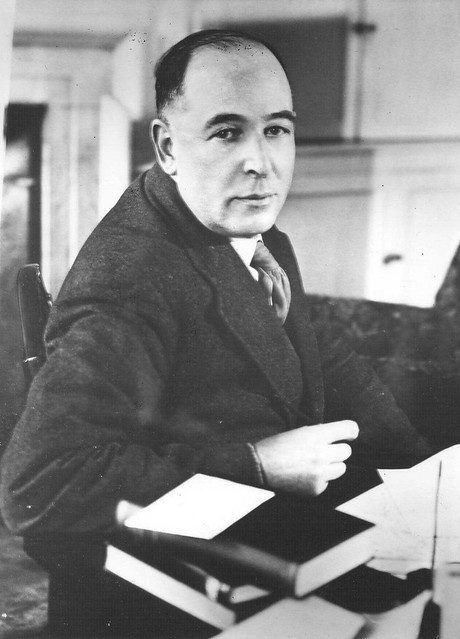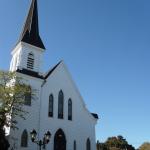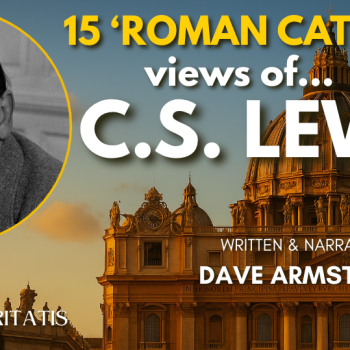
I think C. S. Lewis’s approach to ecumenism was quite wise. He had many close friends (several of the “Inklings”) who were (or eventually would become) Catholic, including George Sayer, who wrote a highly-acclaimed biography (Jack: C. S. Lewis and His Times, 1988), Jim Dundas-Grant, Humphrey Havard, Fr. Gervase Mathew, Dom Bede Griffiths, Christopher Derrick, Fr. Walter Hooper, Sheldon Vanauken, Fr. Martin D’Arcy, and J. R. R. Tolkien, who helped him to convert to Christianity, by describing it as a “true myth.”
Lewis himself held many views similar or identical to Catholic teaching (e.g., on purgatory), as somewhat of an Anglo-Catholic. In 1953 Lewis wrote the following in a letter to a friend who had become a Catholic:
Though you have taken a way which is not for me I nevertheless can congratulate you — I suppose because your faith and joy are so obviously increased. Naturally, I do not draw from that the same conclusions as you, but . . . I believe we are very near to one another . . . In the present divided state of Christendom, those who are at the heart of each division are all closer to one another than those who are at the fringes . . . Let us by all means pray for one another: it is perhaps the only form of “work for reunion” which never does anything but good. God bless you. (Letters to an American Lady, Grand Rapids, Michigan: Eerdmans, 1967 — letter from 1953, 11-12)
I am very much of this mind myself: I feel that people who are trying their best to follow the orthodox Christian traditions of their own denominations are kindred spirits in many, many ways, whereas the liberals and so-called “traditionalists” of my own camp, Catholicism (as well as the nominal Catholics not very committed to their walk with Jesus as a disciple), often seem like strangers to me. In my mind, I have much more in common with an ecumenical Calvinist or Anglican. I think that gets to what Lewis was trying to express. He made other similarly wise utterances in this regard:
That the whole cause of schism lies in sin I do not hold to be certain. I grant that no schism is without sin but the one proposition does not necessarily follow the other . . . what would I think of your Thomas More and of our William Tyndale? All the writings of the one and all the writings of the other I have lately read right through. Both of them seem to me most saintly men and to have loved God with their whole heart: I am not worthy to undo the shoes of either of them. Nevertheless they disagree and (what racks and astounds me) their disagreement seems to me to spring not from their vices nor from their ignorance but rather from their virtues and the depths of their faith, so that the more they were at their best the more they were at variance. I believe the judgement of God on their dissension is more profoundly hidden than it appears to you to be: for His judgements are indeed an abyss. (Letters: C.S. Lewis / Don Giovanni Calabria [25 November 1947], 37, 39)
*
Tomorrow I am crossing over (if God so have pleased) to Ireland: my birthplace and dearest refuge so far as charm of landscape goes, and temperate climate, although most dreadful because of the strife, hatred and often civil war between dissenting faiths. These indeed both yours and ours “know not by what Spirit they are led.” They take lack of charity for zeal and mutual ignorance for orthodoxy . . . Let us, however, with mutual prayers pray with all our power for that charity which “covers a multitude of sins.” (Ibid., [10 August 1953], 39)
‘That they all may be one’ is a petition which in my prayers I never omit. While the wished-for unity of doctrine and order is missing, all the more eagerly let us try to keep the bond of charity. (Ibid., 71)
All who profess themselves Christians are bound to offer prayers for the reunion of the Church now, alas, torn and divided. (Ibid., 99)
As a Christian, I am very much aware that our divisions grieve the Holy Spirit and hold back the work of Christ; as a logician I realize that when two churches affirm opposing positions, these cannot be reconciled.
But because I was an unbeliever for a long time, I perceived something which perhaps those brought up in the Church do not see. Even when I feared and detested Christianity, I was struck by its essential unity, which, in spite of its divisions, it has never lost. I trembled on recognizing the same unmistakable aroma coming from the writings of Dante and Bunyan, Thomas Aquinas and William Law.
Since my conversion, it has seemed my particular task to tell the outside world what all Christians believe. Controversy I leave to others: that is the business of theologians. I think that you and I, the laity, simple soldiers of the Faith, will best serve the cause of reconciliation not so much by contributing to such debates, but by our prayers, and by sharing all that can already be shared of Christian life.
If the unity of charity and intention between us were strong enough, perhaps our doctrinal differences would be resolved sooner; without that spiritual unity, a doctrinal agreement between our religious leaders would be sterile.
In the meantime, it will be apparent that the man who is most faithful in living the Christian life in his own church is spiritually the closest to the faithful believers in other confessions: because the geography of the spiritual world is very different from that of the physical world. In the latter, countries touch each other at their borders, in the former, at their center. It is the lukewarm and indifferent in each country who are furthest from all other countries. (Preface to the French edition of La Problem de la Souffrance, 1950)
. . . such silence need not mean that I myself am sitting on the fence. Sometimes I am. There are questions at issue between Christians to which I do not think we have been told the answer. There are some to which I may never know the answer: if I asked them in a better world, I might (for all I know) be answered as a far greater questioner was answered: “what is that to thee? Follow thou Me”. But there are other questions as to which I am definitely on one side of the fence and yet say nothing. For I was not writing to expound something I could call “my religion” but to expound “mere” Christianity, which is what it is and what it was long before I was born and whether I like it or not (Preface to Mere Christianity, New York: Macmillan, 1952, 7)
I hope no reader will suppose that “mere” Christianity is here put forward as an alternative to the creeds of the existing communions –- as if a man could adopt it in preference to Congregationalism or Greek Orthodoxy or anything else. It is more like a hall out of which doors open into several rooms. If I can bring anyone into that hall I shall have done what I attempted. But it is in the rooms, not in the hall, that there are fires and chairs and meals. The hall is a place to wait in, a place from which to try the various doors, not a place to live in…When you do get into your room you will find that the long wait has done you some kind of good which you would not have had otherwise. But you must regard it as waiting, not as camping. You must keep on praying for light: and of course, even in the hall you must begin trying to obey the rules which are common to the whole house. And above all you must be asking which door is the true one; not which pleases you best by its paint and paneling. In plain language, th question should never be: “Do I like that kind of service?” but “Are these doctrines true: Is holiness here? Does my conscience move me towards this? Is my reluctance to knock at this door due to my pride, or my mere taste, or my personal dislike of this particular doorkeeper?”
When you have reached your own room, be kind to those who have chosen different doors and to those who are still in the hall. If they are wrong they need your prayers all the more; and if they are your enemies, then you are under orders to pray for them. That is one of the rules common to the whole house. (Ibid., 11-12)
In his essay, “Christian Reunion” (Christian Reunion and Other Essays, edited by Walter Hooper, London: Collins, 1990, 17-19) Lewis wrote:
The real reason why I cannot be in communion with you [Catholics] is not my disagreement with this or that Roman doctrine, but that to accept your Church means, not to accept a given body of doctrine, but to accept in advance any doctrine your Church hereafter produces. It is like being asked to agree not only to what a man has said but also to what he is going to say.
Lewis thus remains firmly in the Protestant camp insofar as he cherishes the right of private judgment more than the notion of submission to a higher human ecclesiastical authority, believed in faith to be protected from error and thus worthy of one’s allegiance without fear of being led astray (i.e., the Protestant Rule of faith rather than the Catholic one). One can only wonder, however, what he would have thought about present-day Anglicanism? We know that he was firmly opposed, for example, to women priests.
And I remain in the Catholic camp for the opposite reasons, and I think G. K. Chesterton’s observation is true:
It is impossible, I hope, for any Catholic to write any book on any subject . . . without showing that he is a Catholic. (Prefatory Note to The Everlasting Man, 1925 — one of the books which most influenced Lewis)
Yet I find myself in close agreement with (my favorite writer) Anglican C. S. Lewis’s ecumenical sentiments above, and that gives me hope for a type of ecumenism that is respectful of the distinctives of different Christian communions (so that it is not liberal) but also is passionately committed to as much unity and “community” as is possible (so that it is biblical and charitable).
John Wesley’s famous Letter to a Roman Catholic, dated July 18, 1749, and published in Dublin, in the context of great inter-faith bitterness, expresses the same wonderful spirit:
Brotherly love is utterly destroyed and each side, looking on the other as monsters, gives way to anger, hatred, malice, to every unkind affection . . . Can nothing be done, even allowing us on both sides to retain our own opinions, for the softening our hearts towards one another, the giving a check to this flood of unkindness? . . . Be our opinions right or be they wrong, these tempers are undeniably wrong . . .I think you deserve the tenderest regard I can show . . . How much more, if you are a person fearing God (as without question many of you are) . . .
Let us resolve, first, not to hurt one another, to do nothing unkind or unfriendly to each other . . . Let us resolve, secondly, God being our helper, to speak nothing harsh or unkind of each other . . . to say all the good we can, both of and to one another . . . Let us, thirdly, resolve to harbour no unkind thought, no unfriendly temper towards each other . . . Let us, fourthly, endeavor to help each other on in whatever we are agreed leads to the Kingdom. So far as we can, let us always rejoice to strengthen each other’s hands in God.
Obviously, I don’t think any of this rules out my own calling of apologetics (Lewis and I would likely disagree on that because he saw himself as an exponent of “mere Christianity” rather than as an advocate of Anglicanism or any other Christian communion — though I did write two books from a strictly “generic Christian” perspective, even titling one Mere Christian Apologetics). I think apologetics can be done with charity — as Lewis himself aptly demonstrated (though some will always be offended by it no matter how charitable one tries to be). And I think that disagreeing with a man’s ideas is not the same as insulting him or being “disrespectful,” etc.
That said, I wholeheartedly endorse what I quoted above.
***
Related Reading:
C. S. Lewis’ Childhood in Belfast & Contra-Catholicism (Biographers and/or Friends Kreeft, Pearce, Derrick, and Possibly Tolkien Think This is Why Lewis Never Became a Catholic) [6-26-12]
Why Didn’t C. S. Lewis Become a Catholic? [8-29-14]
Dialogue on Why C. S. Lewis Didn’t “Pope” [9-1-15]
C. S. Lewis vs. St. Paul on Future Binding Church Authority [National Catholic Register, 1-22-17]
Why C. S. Lewis Never Became a Catholic [National Catholic Register, 3-5-17]
C. S. Lewis on Catholicism (Correspondence: 1934-1947) [9-13-19]
***
(originally from 16 June 2003)
Photo credit: Levan Ramishvili; uploaded on 7-12-18. C. S. Lewis: c. 1940 [Flickr / Public domain]
***













